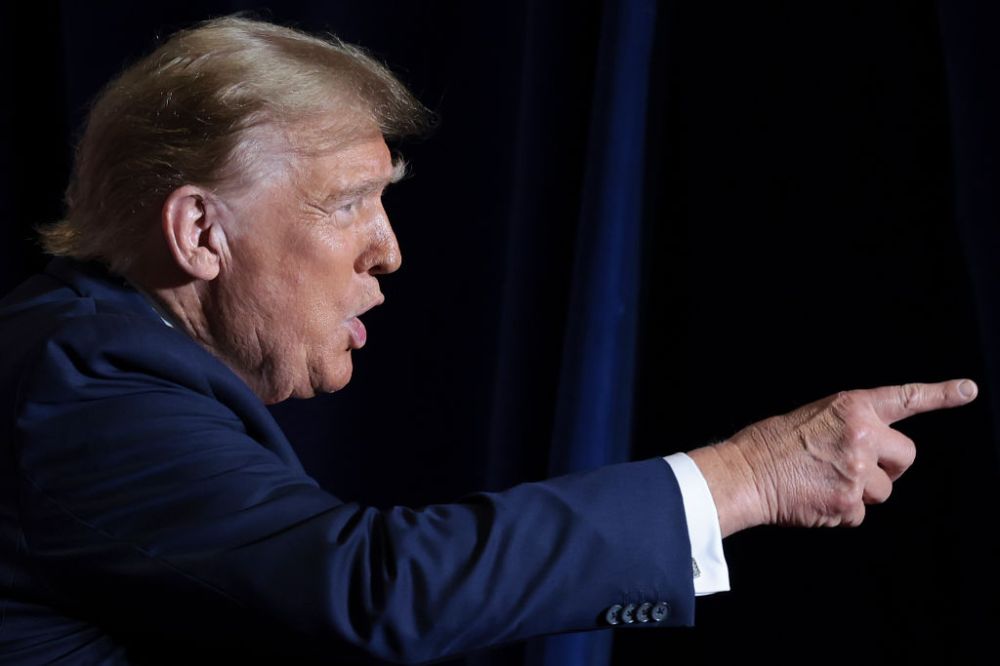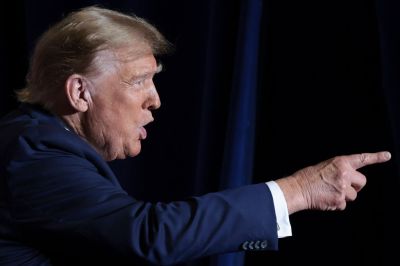A perspicacious pundit noted recently that this is the tightest presidential race in 20 years. If you doubt it, take a peek at the polling margins between Donald Trump and Kamala Harris in the seven states that will decide the election.
Typically, we have a frontrunner by Labor Day, and so this is traditionally the time in the cycle that the underdog’s base begins to cope with the prospect of defeat. One form of cope is of the “keep hope alive” variety: The polls are skewed, the media is biased, the candidate has made mistakes but has time to correct them. We can still win.
Another form is rationalizing defeat as somehow good for the party long-term. “If Republicans Want to Win, They Need Trump to Lose—Big,” Politico’s Jonathan Martin argued a few days ago, not entirely persuasively. Certainly, Reagan Republicans would benefit from a Democratic landslide this fall that sours the right on nominating Trumpist wackos going forward. That’s the Never Trump case for Harris in a nutshell.
But partisan Republicans generally? It seems to me that if they want to win, they should, er, want to win.
The third form of cope is fingerpointing. The likelier it becomes that your candidate will lose, the more reason you have to begin pre-spinning that loss as some political enemy’s fault. Because there’s no frontrunner in this year’s race, both parties stand a solid chance of losing—and so we should expect activists on both sides to start floating trial balloons about who’s really to blame for their defeat.
And that is, in fact, what we’re seeing. On the left and right, cope-phase fingerpointing has begun.
Blame the media.
If Harris loses this race, I expect the average Democratic partisan will lay most of the blame where it belongs. That’s on Joe Biden, who shouldn’t have run for reelection amid spiraling anxiety about his age and whose party had to relearn the hard way that high inflation is too burdensome for most incumbent administrations to overcome.
Harris will take a few knocks, too, especially if she loses Pennsylvania after snubbing that state’s governor in choosing a running mate. She’s run a vapid, overly cautious campaign; some will argue a bolder nominee might have prevailed.
But the left will also have to answer a question that will haunt Never Trump conservatives: How did the voters of this country reach a point where they preferred a second ride on the crazy train to four years with a sane, young-ish establishment Democrat? How is Donald Trump still politically viable in the year of our Lord 2024?
One theory that’s kicking around this week has to do with “sanewashing.”
“Sanewashing” was coined by New Republic writer Parker Molloy to describe the media’s habit of cleaning up Trump’s disjointed ramblings to make them more intelligible. As an example, take a stiff drink and try to make your way through the transcript of what he said on Thursday when asked how he intends to make child care more affordable as president. It’s impenetrable. The answer boils down to “tariffs,” but no summary can do it justice.
The Associated Press headline about his response was as anodyne as could be: “Trump suggests tariffs can help solve rising child care costs in a major economic speech.” The story itself is appropriately skeptical about the economics involved, but there’s no hint that he struggled to sustain a lucid thought.
This sort of “sanewashing” is a threat to democracy, Molloy writes. “By continually reframing Trump’s incoherent and often dangerous rhetoric as conventional political discourse, major news outlets are failing in their duty to inform the public and are instead providing cover for increasingly erratic behavior from a former—and potentially future—president.”
No argument on my end. “The media got Trump elected” is a hobby horse of Never Trumpers dating back to 2016, in fact. I wrote an entire column identifying Trump’s mental, ahem, “fragility” as the elephant in the room of this election less than a month ago. As a matter of good journalistic practice, Molloy’s advice should be heeded. A reporter’s job is to tell the truth, and if the truth is that a candidate still can’t discuss policy coherently in his third campaign for president, that needs to be noted.
But let’s be real. Obnoxious though it may be, “sanewashing” isn’t why Trump is competitive with Harris.
“I didn’t say that it was,” Molloy might reply. Okay, but the New Republic piece is part of a chorus of liberals alleging media bias in Trump’s favor that’s growing louder as Election Day creeps closer and Harris fails to pull away. (The New York Times is a favored target.) It’s not that the press is pro-Trump, they insist, it’s that they’ve let their ethic of impartiality lead them to “false balance” between Trump and Harris. They’re normalizing his insanity with techniques like “sanewashing,” which is leading voters to treat him as an acceptable option for president.
It all feels like a very 2016 argument to me. Show me the voter in 2024 who’s sat through eight years of Trump and is still thinking of voting for him, yet might be shaken from their stupor if only the media offered them more accurate transcripts of his goony mumblings about tariff-ing our way to free child care.
The man attempted a coup. He was impeached twice. If he wins in November, he might end up planning his presidential transition from a prison cell. If he loses, practically everyone expects him to freak out and reject the results. There’s no “sanewashing” him at this point. Even if there were, he’s hellbent on getting dirty again every time the press washes him clean. His convention acceptance speech this year was supposed to be a short, tight address reflecting on the attempt on his life; instead, he ended up babbling like a loon for an extra hour before a national TV audience, finishing after midnight.
He doesn’t seem much worse cognitively today than he was in his first campaign, frankly. (Not coincidentally, Molloy has been on the “sanewashing” beat since at least 2020.) Now, as then, he has a chronic, incurable case of mental diarrhea. The press can either lead every story with the headline “MORE DIARRHEA FROM TRUMP” or it can take as a given that the public understands he has “the trots” between his ears and focus on his plans.
Or, I suppose, it can treat his psychological fitness as a distinct sub-topic of election coverage, not unlike how it did with occasional stories about Joe Biden’s age and mental wherewithal before the first debate. But the Biden precedent is underwhelming—there was lots of “sanewashing” there too—and I think the perception that the media despises Trump is sufficiently widely held that a “Trump is nuts” beat will be dismissed by most as just another form of bias.
And so all of this feels like cope. Although Molloy is right on the merits, the left’s carping about the press while Harris struggles to put Trump away reeks of an attempt to shift blame from Democrats and onto journalists for somehow failing to keep him outside the Overton window. It’s painful for liberals to accept that a boorish right-winger might have vacuumed up enough of their working-class base to win national elections. And it’s intensely painful for all of us to accept that there are enough traitors to America’s civic tradition in this country to trust an authoritarian like Trump with power—again.
The left didn’t fail. The center didn’t fail. It must be that the media failed.
Blame the Nazis.
We all know how the average right-wing partisan will process defeat. Trump is already laying the groundwork for it. At a rally in North Carolina last month, he went so far as to say that “our primary focus is not to get out the vote, it’s to make sure that they don’t cheat. Because we have all the votes you need.” That must be the first time in political history that a candidate has downplayed the importance of turnout.
He wasn’t speaking rhetorically, either: The GOP really is more focused on ballot-counting than ballot-casting this year. “Why is the RNC building out hundreds of thousands of people for an ‘election integrity project’ instead of hundreds of thousands of precinct captains and GOTV [get out the vote] people focused on actually convincing and turning out voters?" one Republican operative wondered to NBC News recently. “It’s because it’s much easier to yell ‘rigged’ when [Trump] inevitably loses another f—ing winnable race because he has no idea how to make a case for his own vision.”
Trump-loving Republicans will know whom to blame for a defeat. But what about traditional right-wingers, the anti-anti-Trump conservatives who still value their membership in the Republican tribe for some reason? They know that his “rigged election” nonsense is nonsense, yet they also know that most other members of the tribe won’t tolerate them blaming him for losing. So whom do they blame?
In a word, Nazis.
Amid the disgust at Tucker Carlson’s friendly chat with a World War II revisionist this week, some conservative commentators speculated that Tucker and his minions secretly … want Trump to lose. “Tucker Carlson wants Kamala elected so that he can remain relevant,” columnist Caroline Glick theorized. “To this end, he is pushing Jew-hatred on MAGA. He wants a Republican civil war that will bring Kamala to power. A Kamala presidency will also institutionalize anti-semitism in the U.S., which Carlson supports.”
Journalist Abigail Shrier agreed. “Tucker Carlson is a very bright man,” she wrote. “He has the largest conservative podcast in the country, and eight weeks before a presidential election, he is approvingly boosting Nazi apologists. The Occam's Razor explanation? He wants Kamala Harris to win.” Populist “influencer” John Cardillo went so far as to say that there’s no other possible explanation.
Isn’t there, though? The actual Occam’s Razor explanation for Carlson’s behavior is “he likes Nazi apologists and wishes to support them,” as Crooked Media’s Jane Coaston put it. Simple as that. There’s no elaborate nationalist plan to tank Donald Trump’s chances for the sake of heightening the contradictions between the right and the left.
Trump is their plan.
And rather than face that truth forthrightly, respectable right-wingers who find themselves now making common cause electorally with Nazi apologists are resorting to desperate cope by pretending that there’s no common cause at all. The mainstream right wants to be governed by Republicans, the Nazis want to be governed by Democrats. Tucker is trying to throw the election.
Tucker Carlson is many things, but he’s not a moron. Whatever benefit his niche of the right might gain from Republicans being radicalized by a Harris presidency pales in comparison to the influence he could wield as a confidant of President Donald Trump. If you want the U.S. out of NATO and the Far East; if you want cozy relations with fascist regimes like Russia; if you want a sustained effort to rid America of “invaders” from Mexico; if you want to mainstream right-wing kookery of all stripes; then you’re far better off with Trump winning now and normalizing those things in a second term than you are gambling that the right might go full Nazi as part of a backlash to the Harris administration.
After all, who’s to say that Republican voters wouldn’t lose their appetite for authoritarianism if their hero falls short again in November, as so many Beltway conservatives are hoping? With Trump gone, Tucker could find himself relegated to an increasingly unpopular fringe by 2028. The postliberal plan, as it was in 2020, is to win power now by hook or by crook and dare the regnant liberal order to pry it from their hands.
J.D. Vance isn’t a moron, either. If Carlson were as poisonous politically as Glick and Shrier (and I) wished he were, one would think the GOP’s vice presidential nominee would feel a duty to cut ties with him as a matter of electoral self-interest. He hasn’t. “Senator Vance doesn’t believe in guilt-by-association cancel culture,” a spokesman said when asked whether he’ll ditch Tucker following his interview with historical revisionist Darryl Cooper. The spokesman did allow that his boss doesn’t share Cooper’s views—but it turns out that Vance follows Cooper on social media from his personal account. So who knows?
The Republican ticket is so unconcerned by how voters might view its warm relations with the pro- and anti-anti-Nazi right that Vance reportedly recorded an interview with Carlson on Thursday after the uproar over the Cooper segment. And why wouldn’t he? Tucker is his political patron.
So where is this idea coming from that Carlson is going to, let alone trying to, blow the election for Republicans with his antics? My guess is that Trump and Vance believe that keeping him in their corner is crucial to making sure that all elements of the Republican base remain eager to turn out on Election Day. They seem to believe that the just-asking-questions Nazi-apologist contrarian niche of populism will take greater offense if they attack Tucker than swing voters will if they hug him. Are we sure they’re wrong?
Insisting that they must be wrong reeks of cope. It’s wishful thinking.
“Carlson’s actions and statements are a direct threat to [Trump’s] campaign and a frightening effort to mainstream the hatred of Jews,” Jonathan Tobin wrote this week. “He must be put in his place, and condemned by Trump and Vance, if the Republicans are to defeat Harris.” He will not be put in his place or emphatically condemned; I doubt Trump will even offer the sort of half-hearted if-you-insist disavowal that he made in 2016 about David Duke’s endorsement. Tobin knows as well as I do that the only moral criterion Trump has in assessing other people is whether they like him. And despite all of that, he might win anyway—which would have dark implications for tolerance of antisemitism in America generally and on the right specifically.
But in case he loses, traditional conservatives like Tobin, Glick, and Shrier are getting a jump on offloading blame for his defeat onto the dregs of the postliberal right. The GOP after Trump will be an orgy of recriminations; it’s not too early for decent people to start discrediting the Tucker faction by seeding the idea that the Nazis cost Trump the election. All I ask of them as they forge ahead inexplicably with this wretched coalition is honesty about the state of it. They’re working with fascists toward a common goal of getting Donald Trump elected, each in the belief that their faction will be the one that has the president’s ear.
One of them will be wrong.







Please note that we at The Dispatch hold ourselves, our work, and our commenters to a higher standard than other places on the internet. We welcome comments that foster genuine debate or discussion—including comments critical of us or our work—but responses that include ad hominem attacks on fellow Dispatch members or are intended to stoke fear and anger may be moderated.
With your membership, you only have the ability to comment on The Morning Dispatch articles. Consider upgrading to join the conversation everywhere.